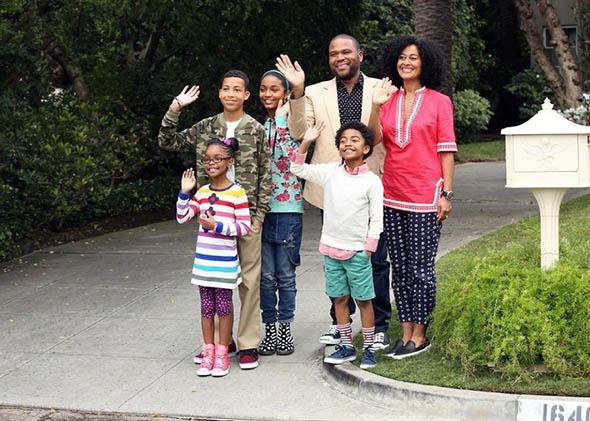Few people warmed to the title of Black-ish when the show premiered last fall. In fact, you could say that the name of Kenya Barris’ ABC sitcom actively outraged some folks (including, of course, the unfailingly charming Donald Trump), and rubbed most others the wrong way, regardless of their race. A change.org petition from last year argued the show should change its name claiming:“We find it racist, socially damaging and offensive based on its concept that non-stereotypical black people are less their race than others, that hip hop culture is all blacks are supposed to embrace, and that culture and race are one in the same.”
The first season of Black-ish ends next month, and there are no signs that Barris or ABC plans to heed their critics.* The title, for now at least, remains the same. And for good reason: It’s been a reliable hit for ABC and, in all likelihood, will return for a second season in the fall, proving that, unlike, say, Cougar Town, its name hasn’t been a barrier for those who otherwise might enjoy the show.
Also unlike Cougar Town, which abandoned the older-woman-dates-significantly-younger-men premise almost immediately, Black-ish has earned the right to call itself “Black-ish.” Take the episode in which Dre Johnson (Anthony Anderson) freaks out about his oldest son’s desire to blend in with all of his white friends and have a Bar Mitzvah for his 13th birthday. “[Dre is] raising kids and a family in a time where he looks around at his kids and he feels like their idea of being ‘black,’ from what he remembers growing up, is different from what it was for him,” Barris told the Huffington Post. And the first episode of the show is all about wrestling with the way blackness is perceived, as line after line plays with stereotypes and assumptions—especially the twist in which Dre is disappointed to learn that his anticipated job promotion to senior vice president is for the company’s … “urban” division. But even as the show plays with stereotypes, it never reinforces them. By the end of the episode, as Willa Paskin wrote in her review for Slate, Black-ish “refuses to oversimplify the place that oversimplifications have in our hearts.”
And that was only the beginning. If many of those who objected to the sitcom’s name tended to couch their uneasiness in a wistful desire for the show to “just be about a family that happens to be black” (essentially, the Cosbys), they were surely disappointed once it became clear that race—and class, which too often go hand-in-hand—would play a significant narrative role throughout the season. In “Black Santa/White Christmas,” for instance, Dre sees the sudden death of white colleague and annual Santa impersonator at the company Christmas party, Fred, as the perfect chance for him to step into the red suit. His mother Ruby disagrees (“Leave Santa to the white folks,” she says. “Let’s get a black James Bond first!”), but he encourages his boss to “think outside the box” when picking the next Santa. Which he does—only instead of picking Dre, he picks co-worker Angelica Rodriguez, a Latina. “Too far from the box!” Dre laments. In another episode, Dre freaks out about his oldest daughter Zoey’s (Yara Shahidi) white boyfriend, conveniently also named Andre. When he expresses his concerns to his colleagues, Charlie (Deon Cole), tells him to loosen up: “Race don’t matter, ’cause in 10 years, we’re all gonna look Puerto Rican.” (The real concern, his colleagues inform him, should be Andre’s “Frenchness,” which supposedly makes him the descendant of “erotic pioneers.”)
This is what Black-ish does often, and usually well: It unabashedly twists, expands, flips, and contorts our ideas about race, class, and gender. It offers a non-PC but honest look at what it can feel like to be black in America today. Frequent comparisons are made to The Cosby Show, and that’s not totally off-base—just a couple of weeks ago, the show made a direct reference to one of that show’s classic musical moments. But when it comes to racial specificity, Black-ish more heavily resembles Lee Daniels’ Empire. The soap opera is far too quick-paced and plot-heavy to spend too much time digging deeply into racial politics (which arise mostly in a “thot” line here, a line about appearing on “white TV” there), but both shows are doing something The Cosby Show never did by acknowledging that race actually exists. As written, the Johnsons and the Lyons are undoubtedly black, and the writers seem to trust that their non-black viewers will find a way to connect with their characters.
At the conclusion of each Black-ish episode, there is no hard and fast “definition” of what it means to be black—in the episode about Zooey’s boyfriend, for instance, Dre ultimately realizes, in true (cheesy) sitcom fashion, that, in his eyes, no one his daughter dates will ever be good enough for her. Black-ish is all about exploring that grey area, and expanding upon the idea of blackness in the 21st century—in the same way, you could say, that the term “monogamish” is all about expanding the notion of what love, relationships, and commitment can mean now. Both terms are provocative, but these days, we need such words more than ever.
Correction, April 8, 2015: This article originally misstated that the Season 1 finale of Black-ish was April 8. The season ends in May. (Return.)
